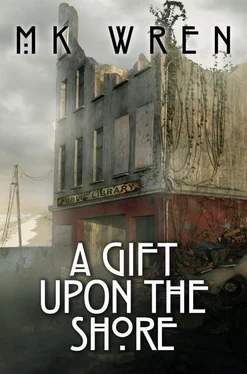The survivors would be here. It made such perfect sense. A big room, underground, where they’d be safe from radiation, where it would be easy to keep warm. They must have some sort of nonelectric stove. Mary reached for the doorknob, but Rachel was shouting at her. “Can’t you smell that?”
Mary couldn’t even hear her. She flung the door open and was three steps into the room before the smell hit her, as palpable as a blow: the sticky, foul smell of death. She covered her mouth and nose with her hand, tried not to breathe, but her pounding heart demanded more air, forced her to inhale the hideous stink.
A cavernous room with a low, beamed ceiling, the only light a pale glow from a propane stove near the door. Rows of folding tables had been put to use as beds. This had been a makeshift hospital. And now it was a charnel house, the table beds occupied by corpses shrouded in bloody, vomit-stained blankets. Her eyes fixed on the bodies nearest the light, on tumid faces smeared with the blood of uncontrollable hemorrhages, on gray skin speckled with red petechiae. The light faded into darkness a short distance from its source, but it was enough to delineate this chamber of horrors. It was enough, as the heat from the stove was enough to maintain the temperature at a level that sustained the processes of decay.
“Lassa.” Rachel’s voice was muffled by her hand. “Oh, damn, they all died of Lassa. Mary, let’s get out of here!”
Mary turned, lunged for the door, ran into Rachel, who had suddenly stopped, staring at the body of a man lying near the door where the glow of the stove lighted his bloated caricature of a face. He was fully dressed; he had apparently simply fallen there.
Rachel whispered, “Reverend Gillis. This was his church.”
Somehow, it intensified the horror to know this corpse had had a name. Mary looked into his swollen face and saw a tiny, flickering movement in his eyelids. “Rachel, he—he’s alive! Look at his eyes!”
Rachel was trying to pull Mary toward the door. “He’s not alive. That’s only maggots.”
Mary staggered, felt darkness closing in like fetid water. She stumbled out the door and up the steps, fell and crashed against the risers, heard panting cries that didn’t stop until she reached the outer door, until she sank to her knees and vomited in the snow.
When the spasms stopped, her ears were ringing, shadows hovered at the edges of her vision. She took a handful of snow and let it melt in her mouth, spat it out. Finally she looked around, saw Rachel sitting on her heels, back braced against one of the columns supporting the portico, Shadow and Sparky crouched on either side of her, panting out clouds of vapor, ears flat against their heads. Rachel was pale, her eyes haunted. She asked, “Are you all right?”
Mary nodded. She couldn’t seem to form even the simple word yes . She clenched her teeth to stop their chattering.
Rachel rose. “I found the propane tank. The one that supplies the stove.” She gestured toward a white mound near the door. The snow had been brushed off the top to reveal a silvery surface bisected by a riveted seam.
Rachel helped Mary to her feet, then took her arm and led her to the street. “Wait here,” she said, and in a few minutes returned with Silver and the dogs. Mary didn’t question her, didn’t speak. Rachel handed her Silver’s reins and a rope looped through both the dogs’ collars. “Hold them for me. Mary? Do you understand?”
Mary didn’t understand her purpose, but she could still understand the words. Rachel walked toward the church, and Mary gripped the reins and rope, shivering uncontrollably, saw Rachel stop when she had covered half the distance to the church, then raise her rifle and, after a moment, fire. The recoil rocked her back. Mary gasped at the shock of the report, held fast against the animals’ lunging. The propane tank exploded with a dull thump. Orange flames billowed, attacked the white clapboards with a vicious crackling.
By the time Rachel returned, whorls of flame were fanning out from the center of the explosion, smoke boiling up into the turbid air until the wind caught it, whipped it seaward. The crackle became a roar, and within minutes the back wall of the church shimmered with flames.
Rachel nodded, her eyes closing. “Ashes to ashes…”
Mary Hope stared into the flames, mesmerized by their shapes. Like the waters of a stream flowing over boulders, they too flowed, always the same and never the same, giving form to processes. Ashes to ashes . Yes, it was fitting; fire was fitting as an end.
Rachel knelt by the stove and put a piece of wood on the fire as if it were an offering. Mary blinked. She wasn’t looking into the flames of the church. The cast-iron Franklin stove. The basement. The cave.
She pulled the blanket around her, hands clenched in the rough wool. Her face was hot; the cold crept up her back. She felt the shift of the big, round hassock as Rachel sat down beside her. Rachel said nothing, and the weight of her silence drew Mary’s eyes to her face. The fire gave it a glow of color that was illusory. The truth was in her eyes, where there was no light except the reflected glint of fire.
Mary turned away, watched the currents of the flames, felt the cold outside scratching at the windows. It infiltrated the earth and the walls of this cave, and only the fire kept it at bay. But the cold was patient; as patient as death.
Yet it wasn’t cold that killed the people at the church. It was something hovering at the edge of life as it was defined: a virus, invisible as the cold and equally deadly.
Had anyone at the Federal Emergency Management Agency taken that invisible factor into their calculations when they considered the survivability of a nuclear exchange?
Mary gazed into the fire, and she had a vision of the heart of this continent: the vast plains where the wind swept unimpeded out of the Arctic. She saw the bombed cities, black cankers of ruin, and she saw the cities, towns, and villages that had not been struck by that terrible, swift lightning. How many were within the fallout plumes? That factor had been calculated. She remembered the maps FEMA had published. On those maps most of the eastern third of the country, from the Mississippi to the Atlantic, was blackened by overlapping plumes. How long does it take to die of radiation poisoning? She remembered the columns of figures expressing that horror statistically. That factor FEMA had calculated to the last decimal point. By now it was over for most of the people in the black plumes.
But in the heart of this continent there was a town that was in the white of the map. A town where tens of thousands of people had survived the war. But how would they survive the invisible armies of disease? Had FEMA calculated that?
There was a hospital in this town. No lights in its windows now, no electricity to run the miraculous machines, no fuel for the auxiliary generators, no medications after the first onslaught of sick and injured. And there never had been a medication that would cure Lassa.
And had FEMA calculated the factor of anarchy, of madness: the madness unleashed out of terror and despair, as explosive and as destructive as the bombs? Would that small plains town, untouched by the bombs, still be a burned-out ruin? Yes, she could see the blighted blocks of rubble. Not all of the town had burned. No. There had been a war in its streets, and someone had won. Road gangs, Klan, NRA, American Legion, National Guard, Army, Apies—the lines were vague now. And who would maintain law and order when all that weighed in the scales of justice was survival?
She saw the town under a dusky, frigid sky, desolately isolated. The communication system that had been the warp and woof of this nation had succumbed to EMP. Electromagnetic pulse, the nemesis FEMA had tried to deny as it had nuclear winter. A few radios were working. They buzzed with static and pleas for help.
Читать дальше












